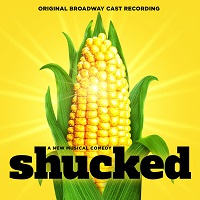 Original Broadway Cast, 2023 (Masterworks Broadway)
Original Broadway Cast, 2023 (Masterworks Broadway)  (3 / 5) Not every musical starts its cast album with the pre-show announcement. But, for better and for worse, Shucked is not every musical. The score, penned by country music veterans Brandy Clark and Shane MacAnally for their first Broadway outing, uses unabashed exposition throughout the first two songs to begin this musical tale set in Cobb County — a small town “that time forgot,” whose main import, export, and hobby is corn. The tone for the show is established in a peppy ode to that very vegetable. (Sample lyric: “It’s the same comin’ in as goin’ out!”) The main disappointment of this recording is that it can’t include the hilarious book by Robert Horn, filled to the brim with puns and one-liners, and hence loses much of the show’s charm. After the two narrators, who sarcastically help set up and comment on the story in a manner akin to Janis and Damian in Mean Girls (Grey Henson, who originated the role of Damian, even portrays Narrator 2), the first character we meet is the innocent heroine, Maizy. (Get it? I thought you might.) Caroline Innerbichler, who plays this role, has a singing voice with a charming, open twang that nicely fits the genre. The first act zips through a farcical story about a hack doctor whom Maizy brings from Tampa to Cobb County to “save the corn,” which for some reason started dying as soon as she was to get married. Plotting is not one of the strengths of Shucked, but listeners can surely lose themselves in the dreamy, husky (no pun intended) voice of Andrew Durand as Maizy’s love interest, Beau, and in the thrilling delivery of “Independently Owned” by Alex Newell as her cousin Lulu. While it’s true that the score for the first act is comprised almost entirely of “I am” and “I want” songs for the various characters, these performers are so uniquely talented that they make it all work. It’s the penultimate song of Act I, “Maybe Love,” that reveals a major problem ahead; in it, the writers begin to fully fall back on country-western cliches. As such, Act II is unfortunately bland, and although Newell’s return seems to promise more delights, he proves to be better at selling a solo number than holding up his half of a duet. The show’s conclusion is somewhat predictable, but a twist was not to be expected from this self-consciously folksy story. Bonus tracks offer the songwriters performing the two most thoroughly country-style numbers in the score; they put them across perfectly, but musical comedy writing is clearly not this team’s forte. — Charles Kirsch
(3 / 5) Not every musical starts its cast album with the pre-show announcement. But, for better and for worse, Shucked is not every musical. The score, penned by country music veterans Brandy Clark and Shane MacAnally for their first Broadway outing, uses unabashed exposition throughout the first two songs to begin this musical tale set in Cobb County — a small town “that time forgot,” whose main import, export, and hobby is corn. The tone for the show is established in a peppy ode to that very vegetable. (Sample lyric: “It’s the same comin’ in as goin’ out!”) The main disappointment of this recording is that it can’t include the hilarious book by Robert Horn, filled to the brim with puns and one-liners, and hence loses much of the show’s charm. After the two narrators, who sarcastically help set up and comment on the story in a manner akin to Janis and Damian in Mean Girls (Grey Henson, who originated the role of Damian, even portrays Narrator 2), the first character we meet is the innocent heroine, Maizy. (Get it? I thought you might.) Caroline Innerbichler, who plays this role, has a singing voice with a charming, open twang that nicely fits the genre. The first act zips through a farcical story about a hack doctor whom Maizy brings from Tampa to Cobb County to “save the corn,” which for some reason started dying as soon as she was to get married. Plotting is not one of the strengths of Shucked, but listeners can surely lose themselves in the dreamy, husky (no pun intended) voice of Andrew Durand as Maizy’s love interest, Beau, and in the thrilling delivery of “Independently Owned” by Alex Newell as her cousin Lulu. While it’s true that the score for the first act is comprised almost entirely of “I am” and “I want” songs for the various characters, these performers are so uniquely talented that they make it all work. It’s the penultimate song of Act I, “Maybe Love,” that reveals a major problem ahead; in it, the writers begin to fully fall back on country-western cliches. As such, Act II is unfortunately bland, and although Newell’s return seems to promise more delights, he proves to be better at selling a solo number than holding up his half of a duet. The show’s conclusion is somewhat predictable, but a twist was not to be expected from this self-consciously folksy story. Bonus tracks offer the songwriters performing the two most thoroughly country-style numbers in the score; they put them across perfectly, but musical comedy writing is clearly not this team’s forte. — Charles Kirsch

